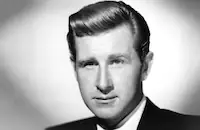From Russia to Hollywood: The 100-Year Odyssey of Chekhov and Shdanoff
Brief Synopsis
Cast & Crew
Frederick Keeve
Anthony Quinn
Lloyd Bridges
Dorothy Bridges
Leslie Caron
Patricia Neal
Film Details
Technical Specs
Synopsis
The legacy of actor-teacher Michael Chekhov and his student-protege George Shdanoff on classical Hollywood actors such as Gregory Peck and Patricia Neal is explored. Coming to Hollywood during World War II, both men helped to create and define a school of acting that offered an alternative to Stanislavsky and Strasberg's ominpresent 'Method.'
Director
Frederick Keeve
Film Details
Technical Specs
Articles
Robert Stack, 1919-2003
Stack was born in Los Angeles on January 13, 1919 to a well-to-do family but his parents divorced when he was a year old. At age three, he moved with his mother to Paris, where she studied singing. They returned to Los Angeles when he was seven, by then French was his native language and was not taught English until he started schooling.
Naturally athletic, Stack was still in high school when he became a national skeet-shooting champion and top-flight polo player. He soon was giving lessons on shooting to such top Hollywood luminaries as Clark Gable and Carol Lombard, and found himself on the polo field with some notable movie moguls like Darryl Zanuck and Walter Wanger.
Stack enrolled in the University of Southern California, where he took some drama courses, and was on the Polo team, but it wasn't long before some influential people in the film industry took notice of his classic good looks, and lithe physique. Soon, his Hollywood connections got him on a film set at Paramount, a screen test, and eventually, his first lead in a picture, opposite Deanna Durbin in First Love (1939). Although he was only 20, Stack's natural delivery and boyish charm made him a natural for the screen.
His range grew with some meatier parts in the next few years, especially noteworthy were his roles as the young Nazi sympathizer in Frank Borzage's chilling The Mortal Storm (1940), with James Stewart, and as the Polish flier who woos a married Carole Lombard in Ernst Lubitsch's To Be or Not to Be (1942).
After serving as a gunnery officer in the Navy during World War II, Stack returned to the screen, and found a few interesting roles over the next ten years: giving Elizabeth Taylor her first screen kiss in Robert Thorp's A Date With Judy (1948); the leading role as an American bullfighter in Budd Boetticher's The Bullfighter and the Lady (1951); and as a pilot in William Wellman's The High and the Mighty (1954), starring John Wayne. However, Stack saved his best dramatic performances for Douglas Sirk in two knockout films: as a self-destructive alcoholic in Douglas Sirk's Written on the Wind (1956), for which he received an Academy Award nomination for supporting actor; and sympathetically portraying a fallen World War I pilot ace who is forced to do barnstorming stunts for mere survival in Tarnished Angels (1958).
Despite proving his capabilities as a solid actor in these roles, front rank stardom oddly eluded Stack at this point. That all changed when Stack gave television a try. The result was the enormously popular series, The Untouchables (1959-63). This exciting crime show about the real-life Prohibition-era crime-fighter Eliot Ness and his G-men taking on the Chicago underworld was successful in its day for several reasons: its catchy theme music, florid violence (which caused quite a sensation in its day), taut narration by Walter Winchell, and of course, Stack's trademark staccato delivery and strong presence. It all proved so popular that the series ran for four years, earned an Emmy for Stack in 1960, and made him a household name.
Stack would return to television in the late '60s, with the The Name of the Game (1968-71), and a string of made-for-television movies throughout the '70s. His career perked up again when Steven Spielberg cast him in his big budget comedy 1941 (1979) as General Joe Stillwell. The film surprised many viewers as few realized Stack was willing to spoof his granite-faced stoicism, but it won him over many new fans, and his dead-pan intensity would be used to perfect comic effect the following year as Captain Rex Kramer (who can forget the sight of him beating up Hare Krishnas at the airport?) in David and Jerry Zucker's wonderful spoof of disaster flicks, Airplane! (1980).
Stack's activity would be sporadic throughout the remainder of his career, but he returned to television, as the host of enormously popular Unsolved Mysteries (1987-2002), and played himself in Lawrence Kasden's comedy-drama Mumford (1999). He is survived by his wife of 47 years, Rosemarie Bowe Stack, a former actress, and two children, Elizabeth and Charles, both of Los Angeles.
by Michael T. Toole

Robert Stack, 1919-2003
Quotes
Trivia
Miscellaneous Notes
Released in United States 1999
Released in United States August 1999
Released in United States 1999
Shown at Hollywood Film Festival (in competition) August 5-9, 1999.
Released in United States August 1999 (Shown at Hollywood Film Festival (in competition) August 5-9, 1999.)























